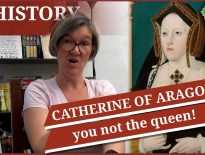On this day in Tudor history, 4th July 1533, two men were burnt at the stake at Smithfield for heresy: reformer and theologian John Frith, for his belief that Purgatory didn't exist and that his views on the sacrament, and tailor's apprentice Andrew Hewt for his belief regarding the sacrament.
In today's talk, Claire Ridgway, founder of the Tudor Society, explains just what was 'wrong' with these men's beliefs and how these men were betrayed, as well as sharing contemporary sources about these men's courageous ends.
Link for further reading about Frith and Hewet - https://www.exclassics.com/foxe/foxe179.htm, and you can read Frith's work online in a three-volume series of the works of Tyndale and Frith - see https://archive.org/details/The_Works_of_the_English_Reformers/page/n9, https://archive.org/details/worksenglishref02russgoog/page/n9 and https://archive.org/details/worksenglishref04russgoog/page/n7. You can also read "A boke made by Iohn Fryth prysoner in the Tower of London : answerynge vnto M. Mores letter, which he wrote agaynst the fyrste lytle treatyse that Iohn Fryth made concernynge the sacramente of the body and bloode of Christ" at https://archive.org/details/bokemadebyiohnfr00frit/page/n8
Also on this day in history:
- 1550 – Appointment of Dr Robert Huick (Hewicke) as Physician Extraordinary to Edward VI by letters patent. His annual stipend was £50. Huick had served Edward's father, Henry VIII, during his final illness, and he also went on to serve Elizabeth I.
- 1551 – Death of Gregory Cromwell, son of Thomas Cromwell, of sweating sickness at Launde Abbey. He was buried at the abbey’s chapel on 7th July. See https://www.theanneboleynfiles.com/the-real-wolf-hall-the-cromwell-family-in-wolf-hall-gregory-cromwell/ for an article on him, and also here for articles on him and his family.
- 1597 – Executions of Catholic priest and martyr William Anlaby with Thomas Warcop, who had been charged with harbouring him, and layman Edward Fulthrop. They were executed at Knavesmire, York. Anlaby was beatified in 1929 by Pope Pius XI.
- 1623 – Death of William Byrd, the famous Elizabethan English composer. He was buried next to his wife in the parish of Stondon Massey in Essex. His biographer, Craig Monson, writes that “Byrd was the first Englishman to master fully the quintessential feature of continental Renaissance music, systematic but flexible imitative textures” and he started his career as a pupil of Thomas Tallis. Byrd's works include “Cantiones sacrae” (1575), “Psalmes, Sonets, & Songs of Sadness and Pietie” (1588), “Songs of Sundrie Natures” (1589) and “Gradualia” (1605-1607).



Leave a Reply